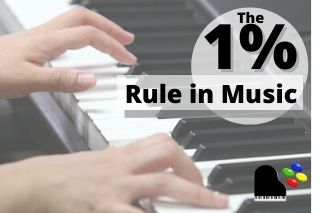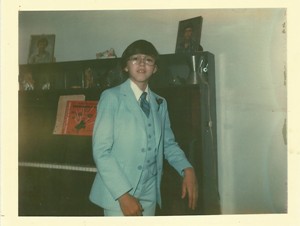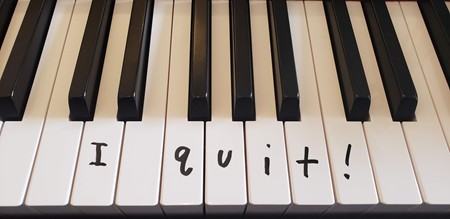The Diary of a Quitter
I want to be the first to admit that I'm a quitter. Or I should clarify that I was a quitter. I was like many kids who took traditional piano lessons until I couldn't take it anymore.
I wasn't the kind of quitter that pondered my commitment to piano lessons and then informed my parents that I  wished to resign as a student. No, it couldn't be that cut and dry.
wished to resign as a student. No, it couldn't be that cut and dry.
Beginning my second year as a piano student, I enrolled in a community school course in which my piano lessons were during school hours. This required me to have a new piano instructor, but I could take lessons during the school day instead of afternoons.
 Everything new is exciting until it gets old. And by the beginning of my third year of piano lessons at school, things got old. I was tired of playing nursery rhymes and plunking out notes while trying to translate dots on a page. And it didn't sound like music.
Everything new is exciting until it gets old. And by the beginning of my third year of piano lessons at school, things got old. I was tired of playing nursery rhymes and plunking out notes while trying to translate dots on a page. And it didn't sound like music.
I started conveniently forgetting my piano books on the Tuesdays I had lessons. And I don't have to tell you that you're not going to get to far in traditional piano lessons without your books.
This went on for no more than a couple of weeks and my Mom was on to me. She told my Dad and one Tuesday afternoon, it hit the fan.
 My Dad came home from work in what was not the best mood. My Mom shared with him what had become of my lack of interest. He was infuriated. It wasn't because he had some lofty goals of me learning to play the piano. He was paying for piano lessons for a kid who wasn't even taking his books to school on lesson days.
My Dad came home from work in what was not the best mood. My Mom shared with him what had become of my lack of interest. He was infuriated. It wasn't because he had some lofty goals of me learning to play the piano. He was paying for piano lessons for a kid who wasn't even taking his books to school on lesson days.
He literally ripped both of my piano books in half in front of me! Yes, I told you he wasn't in a good mood. Even knowing my Dad had a short temper, I was a little shocked.
He then ordered me to go to school the next day and inform my piano teacher that I would no longer be taking lessons.
When the dust settled, my newly purchased piano books laid on the floor ripped in half and my only thought was, "there's no going back."

I dreaded going to school the next day. When I summoned up the courage to go visit Mrs Mittermaier, I told her what I had been instructed to tell her.
I remember a look of disgust on her face. Or maybe it was disapproval. Whatever it was, she wasn't happy I was quitting. I know now that it wasn't the first or the last time she would hear the same sentiment from a student. But that time it was me and I felt embarrassed and ashamed as well as being a quitter. It seems as if the soreness of my emotions lasted a few days.
I didn't miss plunking out simple piano pieces or the tedious boredom of pointless exercises that I didn't understand. I didn't miss the fact that I was the only male student of hers and the recital that reminded me of it. But I did feel bad about being a quitter.
Fast forward many years later and I can say that I didn't fail at piano lessons. They failed me. I was wanting something they couldn't give me and I didn't know the difference and neither did my parents.
It took me another go at traditional piano lessons as an adult for me to realize that I was chasing after the wrong  method of instruction. I needed the skills to play popular songs, rhythms, chords and progressions.
method of instruction. I needed the skills to play popular songs, rhythms, chords and progressions.
I was trying to learn to play music by being a note player. When I stopped looking at the trees I could see the forest.
If you've labeled yourself as a "quitter" for the same reasons I have, I congratulate you. The best time to be a quitter is when something's not working for you.
And like me, you're not a failure, you may have just been failed upon. Or to put it better, been set up for failure by something that wasn't made to work for you.
The 1% Rule in Music
Having a new perspective and outlook on learning to play piano has been one of the greatest rewards of my life. I've  experienced joy more than any other emotion since I've sought out non-traditional piano instruction.
experienced joy more than any other emotion since I've sought out non-traditional piano instruction.
But I have to confess that even though I'm on a different path than I was as a note player, I still experience frustration as a musician even though it's minimal compared to the joy I experience, it's still a part of the growth process.
I've even been a quitter on my new musical journey. However, it's never lasted long. But I've asked myself why? If you know that you're making progress and you're on the right path, why do some students stop studying piano or slow down to a snails pace?
I think it's a lack of understanding of how progress works. There's unnoticeable progress and then there's noticeable progress.
 The unnoticeable progress is not unlike growing tomatoes. On day 5 you're not likely to see anything popping up above the soil, but it's growing nonetheless. The noticeable progress is what we all focus on and what drives us at the piano.
The unnoticeable progress is not unlike growing tomatoes. On day 5 you're not likely to see anything popping up above the soil, but it's growing nonetheless. The noticeable progress is what we all focus on and what drives us at the piano.
So what can keep us engaged even when we're not experiencing noticeable progress? The answer is the 1% Rule in Music.
The 1% Rule in Music is simply this: When you learn to execute a musical concept or idea, it will be 1% or more easier to learn in the same structural context as it transitions to other tones. Those other tones can be keys, chords, progressions, voicings, etc.
Let me give you some examples.
Take a C Major triad. It has a structure to it. It consist of the root, 3rd and 5th tones.
So I'll commit to learning this Major chord (easy task by the way). I'll move on to another Major triad. Let's say F Major triad. It's the same structure.
It's 1% or more easier due to the structure being the same.
The 1% rule is easy to grasp with something that's this elementary. And the reason being is that noticeable progress will often accompany it.
Something that's more challenging has the tendency to question our progress. Take chord inversions. Any triad can be played in 3 different positions due to the fact that there are 3 tones in the chord.
Here we have C in root position
1st inversion and 2nd inversion
and 2nd inversion
The goal is to have proficiency in executing this chord in any position. Moving on to C or G Major, you'll likely experience a large leap in the percentage of easiness to those triads.
But take chords that aren't constructed of all white keys. B flat Major is a combination of black and white keys which is different in appearance.
B flat root position 1st inversion
1st inversion and 2nd inversion
and 2nd inversion This is slightly more challenging. But because you've progressed through learning the C Major triad in all inversions, it's going to be 1% or more easier to learn and execute.
This is slightly more challenging. But because you've progressed through learning the C Major triad in all inversions, it's going to be 1% or more easier to learn and execute.
When learning more intricate concepts, it's easy to forget the 1% rule in music. There's different keys of music and different combinations of black and white keys.
This causes you to have to employ different fingerings and or hand movements. And even though the structure is the same, you're having to exert the brain power to transpose those concepts to different tones.
A particular chord voicing has a certain appearance in the key of C. Let's look at a 7 sharp 9 sharp 5 chord. By the way, this is an altered chord if you're not familiar.
C7 #9#5 G flat 7 #9#5 has a much different appearance despite it being the same chord structure.
G flat 7 #9#5 has a much different appearance despite it being the same chord structure. 
But one has to remember the 1% rule in music and that no matter how frustrating it may seem to transpose this chord to other keys, you're making progress even though you may not consciously feel as though you are.
This is the unnoticeable progress that you're making. A certain amount of our progress is unnoticeable until we have a series of breakthroughs that takes us to the next level of skill. Understanding that progress, even though it can be minuscule, is still progress that we should rejoice about.
I will add that frustration comes. At times we need to take a break from the keyboard and let our mind reset. This in  and of itself isn't quitting. It's simply pressing the pause button. But it should be temporary and it should give you a refreshed feeling when you reengage in your journey of music.
and of itself isn't quitting. It's simply pressing the pause button. But it should be temporary and it should give you a refreshed feeling when you reengage in your journey of music.
Music is fun and it's also joy. Allow yourself to experience both. When you understand these things, it's more difficult to be a quitter than to not be.
Until next time, Go Play!
Greg Lee
Latest posts by Greg Lee (see all)
- What is a minor/Major 7 Chord? - October 26, 2023
- 7 Chord Substitutions that Professionals Use - October 19, 2023
- 5 Simple Chord Tricks to Sound Amazing - October 5, 2023



